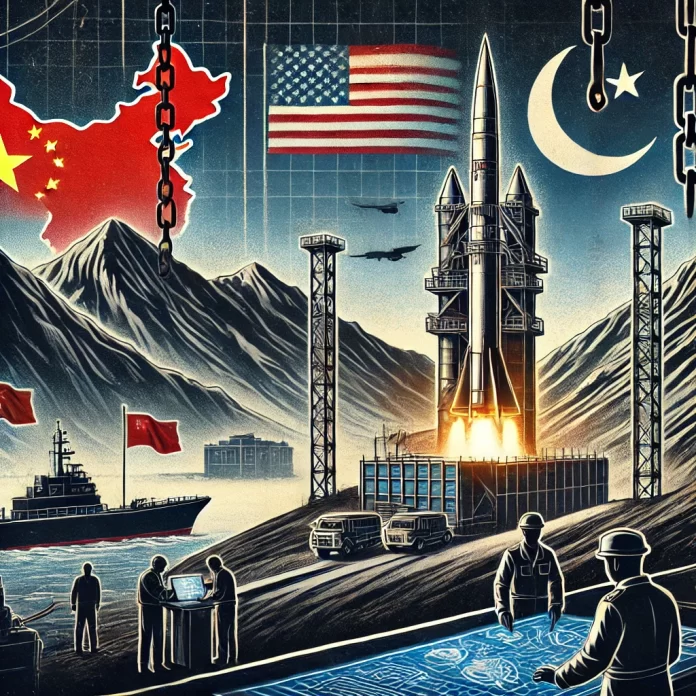The United States recently imposed sanctions on Pakistan, targeting its missile program and several related entities. Among the organizations sanctioned is the National Development Complex (NDC), a significant player in Pakistan’s missile and nuclear weapon development.
A Focus on Pakistan’s Missile Advancements
Established in 1990, the NDC operates under the Pakistan Atomic Energy Commission and has been instrumental in developing various missile systems. These include the Shaheen series, inspired by Chinese designs, and the Nasr missile, which has a short range of 60 kilometers and is advertised as nuclear-capable.
US Targets Pakistan’s Missile Program with New Sanctions
The NDC is also responsible for producing Transporter Erector Launchers (TELs), which are crucial for missile deployment. These facilities rely heavily on Chinese suppliers, showcasing deep ties between Beijing and Islamabad in missile technology. Pakistan’s missile program saw a noticeable surge in 2024, raising concerns globally.
In August, Pakistan conducted a “training launch” of the Shaheen missile, boasting a range of 2,750 kilometers. This development highlighted the country’s progress toward “full spectrum deterrence.” Earlier in the year, Pakistan tested the Ababeel missile, a Multiple Independent Re-entry Vehicle (MIRV) system, aimed at countering ballistic missile defense programs. Another significant event occurred in November when Pakistan launched a ballistic missile from a Zulfikar-class frigate, a move that drew attention due to its potential threat to US assets in the Indian Ocean.
Pakistan’s Ballistic Missile Ambitions: A Growing Concern for the US
China’s Involvement in Pakistan’s Defense Projects
China’s influence on Pakistan’s missile and defense capabilities is evident. Chinese engineers are actively collaborating with Pakistan’s navy in Karachi. This partnership includes the development of advanced submarines like the Hangor 2 class, which faced delays due to Germany’s refusal to supply diesel engines. In April 2024, the first Hangor 2 submarine was launched in China, with plans to produce four more in Pakistan. These submarines could significantly alter the balance of power in the region, further strengthening Pakistan’s naval capabilities.
Additionally, China has provided upgraded technology to Pakistan, enhancing its missile and naval systems. This deep collaboration has raised eyebrows in Washington, especially as Pakistan’s advancements could interfere with US plans in the Indo-Pacific region. The connection between Beijing and Islamabad is under scrutiny, as Chinese companies supplying parts and technology to Pakistan’s missile program may also face repercussions from US sanctions.
Shadowy Networks and Sanctioned Entities
The sanctions extend beyond state-run organizations like the NDC. They also target private entities allegedly involved in smuggling missile-related technology and components. One of these companies, Rockside Enterprise, operates from Karachi’s Clifton area. Though it has minimal online presence, it appears linked to other firms like Akhtar and Sons, a textile company now sanctioned for its alleged involvement in supplying missile components.
Another sanctioned company, Affiliates International, is similarly obscure. These entities resemble the infamous network led by Abdul Qadeer Khan, which smuggled nuclear and missile technologies to multiple countries. Such operations often involve shell companies and complex supply chains, making them difficult to trace.
The purpose of these sanctions is to cut off Pakistan’s missile program from accessing international markets. However, entities like the NDC are closely tied to China, which has its own methods of acquiring technology, both legally and illegally. This raises questions about how effective the sanctions can be in limiting Pakistan’s missile advancements.
While Pakistan has criticized these actions as “double standards,” it is essential to note the distinction between India’s and Pakistan’s approaches. Although some Indian companies have faced sanctions, these were related to supplying parts to Russia and were not part of a state-run network aimed at bypassing international controls. Unlike Pakistan, India’s nuclear and missile programs have largely been developed domestically without reliance on external smuggling networks.
In conclusion, the US sanctions on Pakistan not only aim to curb its missile advancements but also send a message to China. Any continued collaboration with sanctioned Pakistani entities could put Chinese companies under the global spotlight. This dual focus adds a significant layer to the already complex dynamics of non-proliferation efforts.


